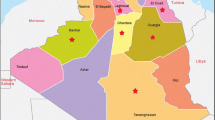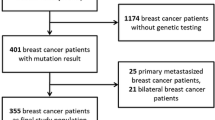Abstract
To investigate the mutations of BRCA1 and BRCA2 and determine whether clinic-pathological factors related to BRCA gene mutation. Mastectomy specimens from 360 breast cancers were enrolled and examined in the study. The relationship between BRCA gene mutation and clinic-pathological factors was evaluated. Overall, 280 patients were BRCA negative and 80 got BRCA gene mutation. Triple-negative breast cancers—i.e., breast cancers that do not express estrogen receptors (ER), progesterone receptors (PR) or human epidermal growth factor receptor 2 (HER2/neu)—was observed in 53.85% of the BRCA1 mutation patients, in 28.57% of the BRCA2 mutation cases, while 14.29% of BRCA negative patients. BRCA1 mutation patients got a heavy lymph node metastasis and higher nuclear grade tumors than the others (P = 0.004, 0.007). Furthermore, BRCA mutation was also found to be significantly related to ER, PR and HER2/neu status (P < 0.05). BRCA1 expression was not associated with breast cancer-specific survival in the triple-negative breast cancers (P = 0.742). After Cox regression, BRCA1 mutation was not shown to be an independent prognostic factor for breast cancer. These findings substantiated the possibility of tumors associated with BRCA1 mutations divided into two distinct groups, triple-negative and non-triple-negative groups requires further investigation.


Similar content being viewed by others
References
Pluta RM, Golub RM (2011) JAMA patient page. BRCA genes and breast cancer. JAMA 305(21):2244
Ford D, Easton DF, Bishop DT, Narod SA, Goldgar DE (1994) Risks of cancer in BRCA1-mutation carriers. Breast Cancer Linkage Consortium. Lancet 343:692–695
Atchley DP, Albarracin CT, Lopez A, Valero V, Amos CI, Gonzalez-Angulo AM, Hortobagyi GN, Arun BK (2008) Clinical and pathologic characteristics of patients with BRCA-positive and BRCA-negative breast cancer. J Clin Oncol 26:4282–4288
Pruthi S, Gostout BS, Lindor NM (2010) Identification and management of women with BRCA mutations or hereditary predisposition for breast and ovarian cancer. Mayo Clin Proc 85:1111–1120
Wu M, Mao C, Chen Q, Cu XW, Zhang WS (2010) Serum p53 protein and anti-p53 antibodies are associated with increased cancer risk: a case-control study of 569 patients and 879 healthy controls. Mol Biol Rep 37(1):339–343
Takano EA, Mitchell G, Fox SB, Dobrovic A (2008) Rapid detection of carriers with BRCA1 and BRCA2 mutations using high resolution melting analysis. BMC Cancer 8:59
He P, Zhu D, Hu JJ, Peng J, Chen LS, Lu GX (2010) pcDNA3.1(-)-mediated ribozyme targeting of HER-2 suppresses breast cancer tumor growth. Mol Biol Rep 37(3):1597–1604
Kirk R (2010) Surgical oncology: cancer risk reduction in BRCA mutation carriers. Nat Rev Clin Oncol 7:609
Han SH, Lee KR, Lee DG, Kim BY, Lee KE, Chung WS (2006) Mutation analysis of BRCA1 and BRCA2 from 793 Korean patients with sporadic breast cancer. Clin Genet 70:496–501
Maegawa RO, Tang SC (2010) Triple-negative breast cancer: unique biology and its management. Cancer Invest 28:878–883
Byrski T, Gronwald J, Huzarski T, Grzybowska E, Budryk M, Stawicka M, Mierzwa T, Szwiec M, Wiśniowski R, Siolek M, Narod SA, Lubinski J, Polish Hereditary Breast Cancer Consortium (2008) Response to neo-adjuvant chemotherapy in women with BRCA1-positive breast cancers. Breast Cancer Res Treat 108:289–296
Goffin JR, Chappuis PO, Bégin LR, Wong N, Brunet JS, Hamel N, Paradis AJ, Boyd J, Foulkes WD (2003) Impact of germline BRCA1 mutations and overexpression of p53 on prognosis and response to treatment following breast carcinoma: 10-year follow up data. Cancer 97:527–536
Møller P, Borg A, Evans DG, Haites N, Reis MM, Vasen H, Anderson E, Steel CM, Apold J, Goudie D, Howell A, Lalloo F, Maehle L, Gregory H, Heimdal K (2002) Survival in prospectively ascertained familial breast cancer: analysis of a series stratified by tumour characteristics, BRCA mutations and oophorectomy. Int J Cancer 101:555–559
Musolino A, Bella MA, Bortesi B, Michiara M, Naldi N, Zanelli P, Capelletti M, Pezzuolo D, Camisa R, Savi M, Neri TM, Ardizzoni A (2007) BRCA mutations, molecular markers, and clinical variables in early-onset breast cancer: a population-based study. Breast 16:280–292
Robson ME, Chappuis PO, Satagopan J, Wong N, Boyd J, Goffin JR, Hudis C, Roberge D, Norton L, Bégin LR, Offit K, Foulkes WD (2004) A combined analysis of outcome following breast cancer: differences in survival based on BRCA1/BRCA2 mutation status and administration of adjuvant treatment. Breast Cancer Res 6:R8–R17
El-Tamer M, Russo D, Troxel A, Bernardino LP, Mazziotta R, Estabrook A, Ditkoff BA, Schnabel F, Mansukhani M (2004) Survival and recurrence after breast cancer in BRCA1/2 mutation carriers. Ann Surg Oncol 11:157–164
Brekelmans CT, Seynaeve C, Menke-Pluymers M, Brüggenwirth HT, Tilanus-Linthorst MM, Bartels CC, Kriege M, van Geel AN, Crepin CM, Blom JC, Meijers-Heijboer H, Klijn JG (2006) Survival and prognostic factors in BRCA1-associated breast cancer. Ann Oncol 17:391–400
Stoppa-Lyonnet D, Ansquer Y, Dreyfus H et al (2000) Familial invasive breast cancers: worse outcome related to BRCA1 mutations. J Clin Oncol 18:4053–4059
Eerola H, Vahteristo P, Sarantaus L, Kyyrönen P, Pyrhönen S, Blomqvist C, Pukkala E, Nevanlinna H, Sankila R (2001) Survival of breast cancer patients in BRCA1, BRCA2, and non-BRCA1/2 breast cancer families: a relative survival analysis from Finland. Int J Cancer 93:368–372
Rennert G, Bisland-Naggan S, Barnett-Griness O, Bar-Joseph N, Zhang S, Rennert HS, Narod SA (2007) Clinical outcomes of breast cancer in carriers of BRCA1 and BRCA2 mutations. N Engl J Med 357:115–123
Hartman AR, Ford JM (2003) BRCA1 and p53: compensatory roles in DNA repair. J Mol Med 81(11):700–707
Author information
Authors and Affiliations
Rights and permissions
About this article
Cite this article
Xu, J., Wang, B., Zhang, Y. et al. Clinical implications for BRCA gene mutation in breast cancer. Mol Biol Rep 39, 3097–3102 (2012). https://doi.org/10.1007/s11033-011-1073-y
Received:
Accepted:
Published:
Issue Date:
DOI: https://doi.org/10.1007/s11033-011-1073-y




